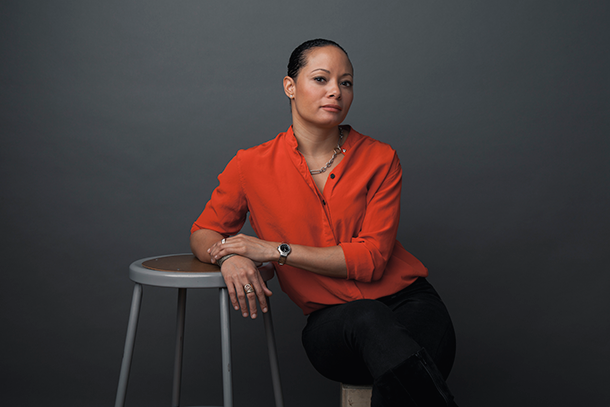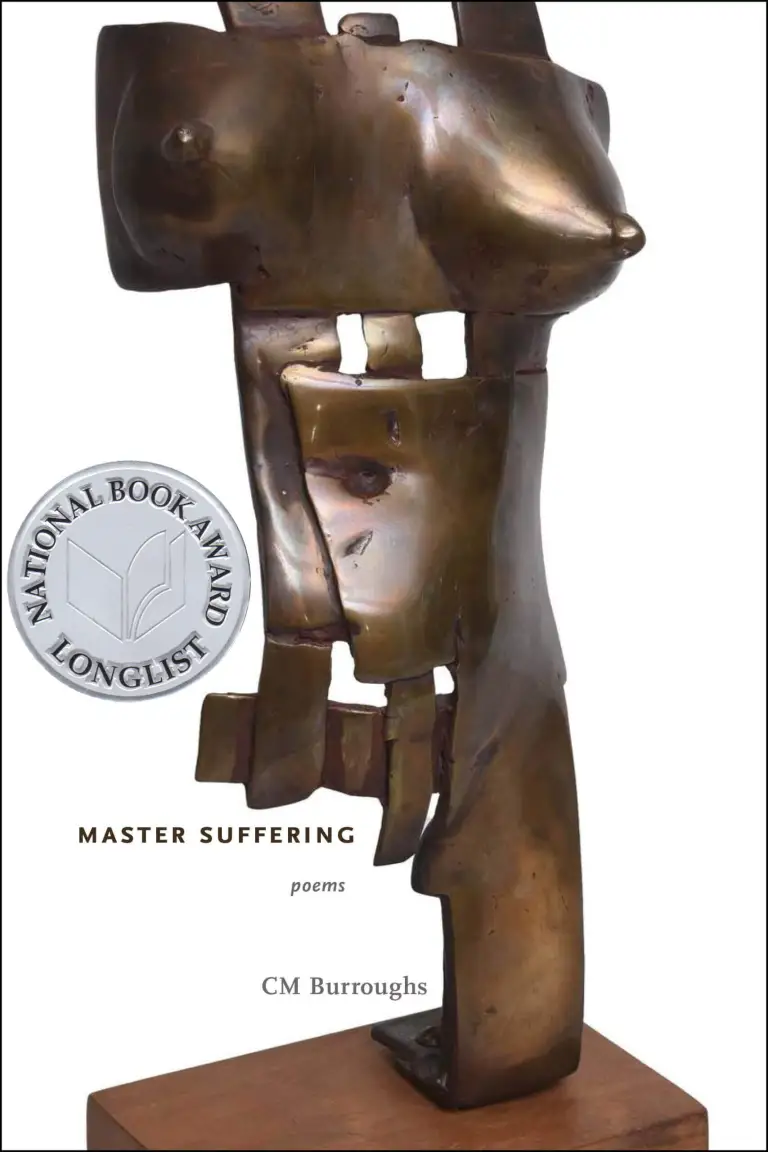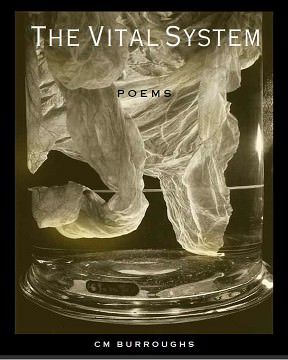

CM Burroughs
Award-winning Poet
National Book Award Longlist


Readings &
Lecture Topics
- An Evening with CM Burroughs
Biography
“With gorgeous horror, Burroughs thrusts the body forward as an intelligence, a syntax, a theater. The narrator of these poems seems to come apart before my eyes; yet she never disintegrates — she teems. Here is vivid grief, livid vulnerability and bristling sensuality. Here is terrible resilience and dangerous vitality.” —Douglas Kearney
“Burroughs delves into the ultra-sensitive roots of being; where sufferings and desires take shape, she gathers each breath as yet unheard and leads it to speech.” —Hélène Cixous
“Burroughs opens a door for her reader onto a world of emotion contained by hospital corners and taut lines; we are invited in, though not as passive onlookers, but ‘active participant[s].’” —Evie Shockley
CM Burroughs is author of the poetry collections The Vital System (Tupelo Press, 2012) and Master Suffering (Tupelo Press, 2021), which was longlisted for the National Book Award in Poetry.
In Master Suffering, Burroughs’ poems are a pendulum swinging between yield and command. The bodies of this book are supplicant yet seething—they want nothing more than to survive. But how does a woman survive? One’s own healthy body helps, but illness is one of the masters of this book. Faith can be a salve for the inscrutable ailments of the body, but God is unreliable in these poems. In Ploughshares’ review of the work, Cynthia Wallace said: “Something like salvation arrives not in self-denial or mastery over another but in the joint, in the space of both self-ownership and shared pleasure. The poems themselves invite a readerly witnessing of pain but also foreclose on full clarity: while some offer up their stories in plain phrasing, others are demanding, resisting interpretation, a mix of self-exposure and enigma.” The female bodies of Master Suffering want power; they want to control and to correct the suffering they witness and withstand.
The Vital System features work that highlights how the body is always at stake—vulnerable—and how the poet dares to try and illuminate what she has called “the protective capability of violence.” Burroughs’ compression of phrasing, subverted syntax, and ability to release a story through cinematically sequenced images allow her to expose particular tensions that are gendered and racial as well as essentially human. Of The Vital System, Evie Shockley observed the “tightly controlled language, make-you-blink images, and ultraviolet emotional registers” present in this debut collection.
Burroughs has read her work at the Warhol and Mattress Factory art museums in Pittsburgh and at the Studio Museum in Harlem, among other galleries, and has received commissions from the Studio Museum of Harlem and the Warhol Museum to create poetry in response to art installations. She has been awarded fellowships and grants from Yaddo, MacDowell, Djerassi Foundation, Virginia Center for the Creative Arts, and Cave Canem. She has received commissions from the Studio Museum of Harlem and the Warhol Museum to create poetry in response to art installations.
Her poetry has been published in journals and anthologies including POETRY magazine, Callaloo, jubilat, Ploughshares, VOLT, Best American Experimental Writing Anthology, and The Golden Shovel Anthology: New Poems Honoring Gwendolyn Brooks.
Burroughs is associate professor of poetry at Columbia College Chicago.
Short Bio
CM Burroughs is author of the poetry collections The Vital System (Tupelo Press, 2012) and Master Suffering (Tupelo Press, 2020), which was longlisted for the National Book Award in Poetry. Burroughs has been awarded fellowships and grants from Yaddo, MacDowell, Djerassi Foundation, Virginia Center for the Creative Arts, and Cave Canem. She has received commissions from the Studio Museum of Harlem and the Warhol Museum to create poetry in response to art installations. Her poetry has been published in journals and anthologies including POETRY magazine, Callaloo, jubilat, Ploughshares, VOLT, Best American Experimental Writing Anthology, and The Golden Shovel Anthology: New Poems Honoring Gwendolyn Brooks. Burroughs is associate professor of poetry at Columbia College Chicago.
Videos
Publications
Master Suffering
Poetry, 2021
“In Burroughs’s brilliant second collection… there isn’t a single poem that misses, which makes it all the more devastating to get through each of these 36 impeccable lyrics.” —Phillip B. Williams
Master Suffering pendulates between yield and command; the bodies of this book are supplicant yet seething—they want nothing more than to survive. But how does a woman survive? One’s own healthy body helps, but illness is one of the masters of this book. Faith can be a salve for the inscrutable ailments of the body, but God is unreliable in these poems. The female bodies of Master Suffering want power; they want to control and to correct the suffering they witness and withstand.
The Vital System
Poetry, 2012
The Vital System is the first published book by a poet already setting off sparks among readers across the globe. In these poems, the body is always at stake — vulnerable — and the poet dares to try and illuminate what she has called “the protective capability of violence.” Burroughs’s compression of phrasing, subverted syntax, and ability to release a story through cinematically sequenced images allow her to expose particular tensions that are gendered and racial as well as essentially human.
Articles & Audio
Read What’s In Print
• Review: Revolving Questions in CM Burroughs’s Master Suffering – Gasher Press
• The Poetics of the Body: An Interview With CM Burroughs – Literary Hub
• Toxicity, Vulnerability, Intimacy: An essay & interview – Boston Review
• Meat to Reckon With: A Conversation with CM Burroughs – Michigan Quarterly Review
Listen to Audio
Selected Writings
Gwendolyn as Lover (originally published in Poetry Magazine)
We fix you maternally in the mind, orient you in a case of “tut-tut,”
“there there,” and “you’re young yet,” but how many times did
you posture yourself for the broad body of him or him and open
like home — his hands in your hair, your nerves rising kinetically
to the cupola of his palms? Lovers’ propensity for being a keep
and your saying (when you mean it), “I am yours.”
We fix you in the mind as bright-sighted seminar, dipping from
the source all that you know, but how often did your eyes light
in flirtation or fight, working from his getting your dander up to
his oval mouth there, there, your teasing tut-tut in arousing
admonition at what he was after, knowing, as you prepared
to keep him, that you were young yet and gleaning, gleaning.

